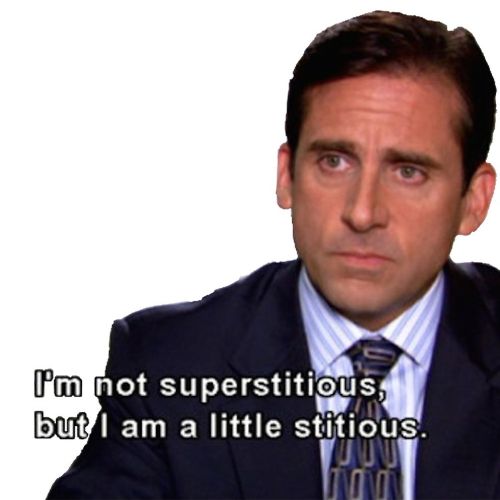EY Y01 L26 Superstition
This week’s Questions

- There are many things that could be considered "unlucky" in your country. Name one. Do you know the origin of this superstition? If yes, please explain. If no, why do you think this thing is considered unlucky?
- What do you keep in your house, car or bag, or do on a regular basis, that you believe brings you good fortune (or wards off misfortune)? If it is an object, tell us about where it is from. If it is an act, tell us about how and when you developed or learned this habit?
- Tell us about a friend, family member or celebrity who has extreme, or funny, superstitious beliefs.
- Would you kill a spider at night? Buy a house or apartment with the number "4" in the address? Pass food between chopsticks? Skip hatsumode because it is cold? Show your thumbs when a hearse passes? Get married on a Butsumetsu day? Step on the threshold to a temple or shrine?
- Do you consider yourself a superstitious person? Why?
- Are Japanese people more superstitious than people from other countries? Why do you think that?
This week’s Responses
Sorry. You must be logged in to view this form.
Teacher’s Compositions

by Michael Kane
Read Now
Question 1
If you walk under a ladder it is bad luck. If you break a mirror you will have bad luck for ten years. The ladder origin is about 5,000 years old and is from Egypt. A ladder forms a triangle when leaning against a wall. In ancient Egypt, a triangle is a sacred shape. You are not supposed to walk through it. In Hindu culture, a mirror is said to hold one's soul. If you break it you have damaged your soul.Question 2
I have a raccoon stuffed animal that my mother gave me for my 12th birthday the day before she died. I have had it now for over 34 years. His name is Jimmy. I think my mum bought him for me because my eldest brother is named James.Question 3
When I was a child my friends used to say "If you step on a line, you will break your father's spine. If you step on a crack you will break your mother's back". We used to say this walking down the sidewalk.Question 4
I would never purposely kill a spider. The number four has no superstition in my culture. I would never pass food between chopsticks. I will always go to the shrine for new years. Don't know about the "show your thumbs when a hearse passes one". I'm already married. I got married on 10/10/10. There might be some superstition to that? I'm sure that I've stepped on the threshold of many shrines. I at least always walk through the torii gate.Question 5
Not really. I think superstitious people believe in ghosts, aliens, astrology and other weird things. I have no belief in that stuff whatsoever.Question 6
I don't think Japanese people are more superstitious than other people. My wife isn't superstitious at all.Tough Vocabulary
- 2 -
comments

by Jon Hay
Read Now
Question 1
Many people consider the number 13 to be unlucky. I am not completely sure where this comes from but I heard that it might have begun in Scandinavia.Question 2
I have a lucky coin that I keep at home. But when I seriously think about it, there is nothing special about it and I just like to believe that it is lucky.Question 3
In Mexico when the clock strikes 12 on New Year's Eve, you should eat 12 grapes in rapid succession. This is to ensure the coming year will be lucky.Question 4
I am ok to buy a house with the number 4 in the address, get married on Butsumetsu, and I have probably/accidentally stepped on the threshold of a temple or shrine. However, I won't pass food between chopsticks and not go to Hatusmode (my wife forces me to go).Question 5
No, I am not a superstitious person although I am sure there are parts of my culture that started out as superstitions but then the meaning became lost and it became something for everyone to do.Question 6
I do not think this current generation in Japan is superstitious but I think the older generations are much more so. The most superstitious places that I have visited are Mexico and Romania.Tough Vocabulary
| - English - | - Japanese - |
|---|---|
| rapid | 迅速 |
| succession | 継承 |
| ensure | 確保する |
- 2 -
comments

by Jim Usher
Read Now
Question 1
Uh... finding a redback in your bed? Actually, I guess not finding it would be worse... Not a superstition so much as just very unlucky.Question 2
I carry a talisman I got from Miwa-jinja with me everywhere I go. It's supposed to grant good health to the one carrying it. I also have a happiness charm on my keyring that my sister gave me. Apparently, it's a recreation of a magic charm from the Book of Solomon. It also looks cool.Question 3
During an appearance on a TV talk show, Heidi Klum admitted that she keeps a bag of her own baby teeth with her at all times. She went on to say "I don't know if it's good luck, it's just a crazy thing that I do." That's pretty weird.Question 4
If I'm aware that performing a certain action is supposed to bring bad luck in one form or another, then I don't do it. I don't trim my nails at night and I usually don't whistle at night either. If I'm going somewhere and a black cat crosses my path, I'll turn around and find another route.Question 5
Yes, I do. I kind of have this theory that if you're thinking really hard about a decision you have to make and you're finding it hard to choose one way or the other, then the universe will send you a sign. Objectively, it's no crazier than praying to this god or that one to ask for help and guidance.Question 6
No, I don't think Japanese people are more or less superstitious than people from other countries. They are just superstitious in different ways to the ones I grew up hearing about. I think Japanese people are maybe more honest about their supersitions, though. I think in the modern day there is a stigma around being superstitious in western countries. Even so, it's socially acceptable to carry around crystals and regularly consult with a psychic. Go figure.Tough Vocabulary
| - English - | - Japanese - |
|---|---|
| a redback | セアカゴケグモ |
| a talisman | お守り |
| in one form or another | 何らかの形で |
| find another route | 別のルートを見つける |
| have a theory | 理論がある |
| find it hard to choose | 選ぶのが難しい |
| one way or the other | いずれかの方法 |
| pray to god | 神に祈る |
| this one or that one | これかあの |
| a stigma | 汚名 |
| socially acceptable | 社会的に受け入れられる |
| go figure | 図を行く |
- 0 -
comments
